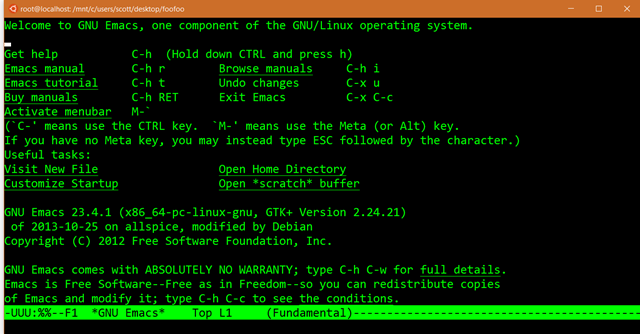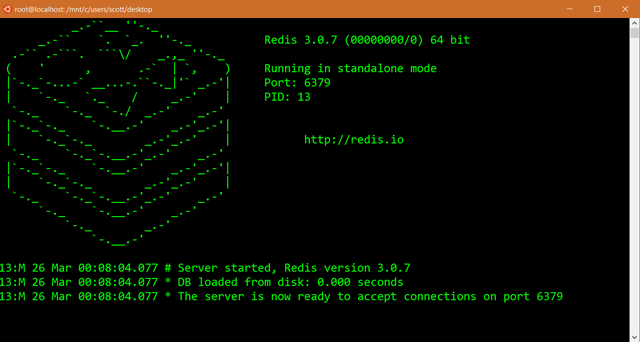Golden Darkness
Member
A pre-recorded discussion video about Bash on Ubuntu on Windows: https://channel9.msdn.com/Events/Build/2016/P488
Meh. Windows PowerShell takes about 5 minutes to set up like a Unix shell with scoop.sh, not that big a deal imo.
Meh. Windows PowerShell takes about 5 minutes to set up like a Unix shell with scoop.sh, not that big a deal imo.
Meh. Windows PowerShell takes about 5 minutes to set up like a Unix shell with scoop.sh, not that big a deal imo.
X Forwarding?
They haven't talked about this, but I can't imagine why it wouldn't be possible. We already have Windows X clients, after all.
They haven't talked about this, but I can't imagine why it wouldn't be possible. We already have Windows X clients, after all.
That would be awesome, but one step at a time, mate.X Forwarding?
These clients bring their own X server implementation to Windows, though.They haven't talked about this, but I can't imagine why it wouldn't be possible. We already have Windows X clients, after all.
X Forwarding?
They haven't talked about this, but I can't imagine why it wouldn't be possible. We already have Windows X clients, after all.
I heard from a reliable source that X is not supported.
I heard from a reliable source that X is not supported.
If they're able to run Linux binaries natively, then why wouldn't it be possible to run an X server and just connect to it with an X client? Perhaps they just mean they don't plan to do any sort of X->native Windows windowing system translation?
If they're able to run Linux binaries natively, then why wouldn't it be possible to run an X server and just connect to it with an X client? Perhaps they just mean they don't plan to do any sort of X->native Windows windowing system translation?
Maybe I'll finally be able to stop typing ls while in cmd.exe
The X servers require access to the hardware (or at least a framebuffer device).If they're able to run Linux binaries natively, then why wouldn't it be possible to run an X server and just connect to it with an X client?
So for those of us who only rarely touched linux, how would having a bash shell implemented in W10 be good and useful? I'm genuinely curious to know what the niche is that bash fills that isn't already filled by cmd and powershell. I'm still learning powershell and have written a script or two, and I've used cmd since the days of DOS 3.3, but I've only screwed around with linux in a VM and using raspian, so I'm not really familiar with all the ins and outs of bash.
I know people can be sensitive about their favorite programs, so I'm not trying to start anything, I just want to learn.
Ahhh, okay. So it's more of a development environment thing? That makes sense. Should be good stuff. I guess it isn't super relevant to my workflow on an all windows network, since I spend a lot of my time remoted into a windows server, working in AD and in powershell. But this makes sense that it'd be a huge get to be able to work with git without installing anything else.
Aw man, all our devs are going to want to upgrade from Win7 this summer, I bet...
Ah well. There are solutions. I just wanted something integrated.
Maybe it's sandboxed? Shouldn't make a difference I guess. I dunno, kinda grasping at straws.
It's not sandboxed. And I honestly don't know, but my guess is that the interaction with Windows' window manager and graphical susbsystem is not easy to work out.
It's not sandboxed. And I honestly don't know, but my guess is that the interaction with Windows' window manager and graphical susbsystem is not easy to work out.
Now reverse them slashes in the your path...
It's the same source code for bash, but recompiled to link against the new libraries that they had to create to emulate Linux system calls:It's not a port. It's the Ubuntu binary running on Windows. Think Wine but the other way around.
Thus this doesn't achieve true binary compatibility; Linux applications will have to be recompiled against WSL to work.We're still trying to get the inside story on what Microsoft has done here, but what we've known for several months now is that the company has developed some Windows kernel components (lxcore.sys, lxss.sys, presumably standing for "Linux core" and "Linux subsystem," respectively) that support the major Linux kernel APIs. These components are not GPLed and do not appear to contain Linux code themselves; instead, they implement the Linux kernel API using the native Windows NT API that the Windows kernel provides. Microsoft is calling this the "Windows Subsystem for Linux" (WSL).
It's the same source code for bash, but recompiled to link against the new libraries that they had to create to emulate Linux system calls:
Thus this doesn't achieve true binary compatibility; Linux applications will have to be recompiled against WSL to work.
Wine has a solution for this where they emulate the NT kernel in a process; some older operating systems (mostly microkernels trying to achieve Linux binary compatibility) also did this to solve the same issue (which I alluded to in my previous post). It doesn't sound like MS has come up for a solution for this yet. The "make something that deals with unhandled traps" runbook is kinda clunky and can be done better, and I'm sure MS knows it can come up with something.
It's the same source code for bash, but recompiled to link against the new libraries that they had to create to emulate Linux system calls:
The initial source explicitly says native, unmodified binary compatibility, and now some people are saying no... I'd like to get the actual skinny on all of this.
The initial source explicitly says native, unmodified binary compatibility, and now some people are saying no... I'd like to get the actual skinny on all of this.
Running bash on Windows hits in the sweet spot. It behaves like Linux because it executes real Linux binaries. Just hit the Windows Key and type bash.
After you're setup, run apt-get update and get a few developer packages. I wanted Redis and Emacs. I did an apt-get install emacs23 to get emacs. Note this is the actual emacs retrieved from Ubuntu's feed.



MS might have a solution for this, and maybe have developed a Linux syscall springboard already (or something similar that works better with the Windows kernel) that would permit true binary compatibility. However, I don't see such a mechanism mentioned in the article linked in the OP, nor have I seen talk anywhere else today mentioning it. I'm confident that MS will achieve true binary compatibility, but there's another mechanism here that they're not talking about that I want to see before I believe. I am extremely excited by the progress MS has made so far though.The initial source explicitly says native, unmodified binary compatibility, and now some people are saying no... I'd like to get the actual skinny on all of this.
I believe Codeacious is wrong; this blog post is from an MS employee showing it off:
http://www.hanselman.com/blog/Devel...ndUsermodeUbuntuLinuxBinariesOnWindows10.aspx
Ah, this was the piece I hadn't seen explained or linked to by any of the articles that I wanted to know about. That's a very interesting approach that involves a good amount of extra bookkeeping and overhead when context switching, but it certainly can be done. I'd be very curious to know how much faster this approach is compared to the older "user-level springboard" I mentioned above.it doesn't need to link against anything special. it uses an entirely different loader. It is not the normal windows loade.r This new loader recognizes that it is an ELF file, parses the ELF file, and then does all the work necessary to create the process and dynamically load all these emulation libraries into the process to translate linux syscalls into windows syscalls
Yeah, see my edit just above. The article in the OP and the ones I read elsewhere all just explained the WSL libraries, which made it sound like MS wanted developers just to recompile against the new libraries. I didn't have any idea if they were springboarding or using some other solution for actually getting Linux binaries to use WSL.Adding a linux subsystem means they have the freedom to make an entirely new loader for it that can load ELF binaries and then dynamically load all the shim libraries in and affect the process in whatever way they want to before running.
MS might have a solution for this, and maybe have developed a Linux syscall springboard already (or something similar that works better with the Windows kernel) that would permit true binary compatibility. However, I don't see such a mechanism mentioned in the article linked in the OP, nor have I seen talk anywhere else today mentioning it. I'm confident that MS will achieve true binary compatibility, but there's another mechanism here that they're not talking about that I want to see before I believe. I am extremely excited by the progress MS has made so far though.
So is it GNU/Windows now?
So is it GNU/Windows now?
Haha, bet Stallman is furiously knocking holes out of a punchcard with a knitting needle to compile his response that will be sent by pigeon to M$.
No fucking way, that is incredible.I believe Codeacious is wrong; this blog post is from an MS employee showing it off:
http://www.hanselman.com/blog/Devel...ndUsermodeUbuntuLinuxBinariesOnWindows10.aspx
It's Ubuntu on Windows.



